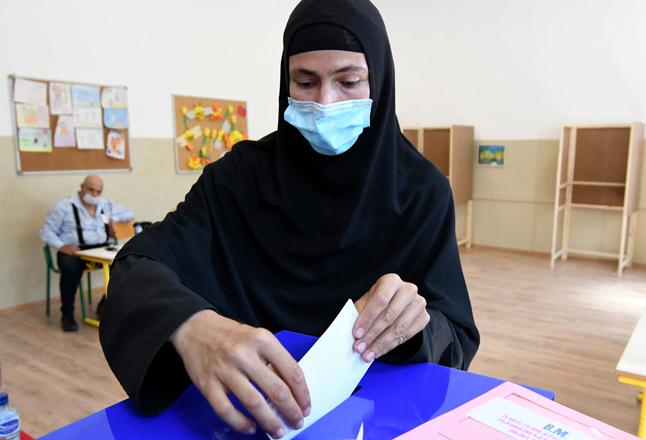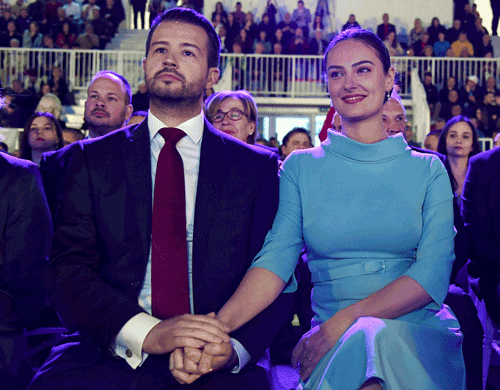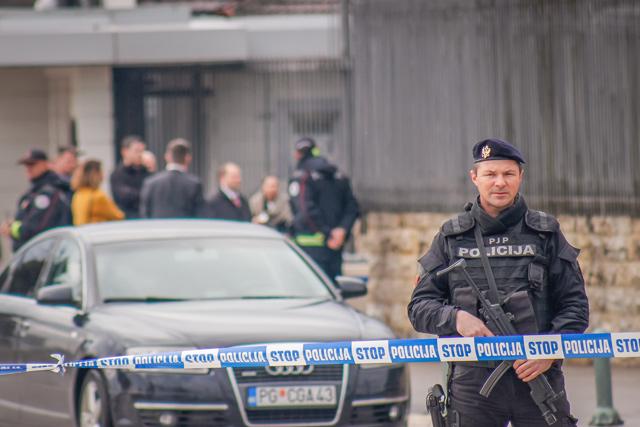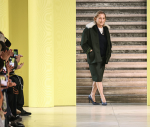You are here
Montenegro votes in tense election dominated by church row
By AFP - Aug 30,2020 - Last updated at Aug 30,2020

An Orthodox nun casts her ballot at a polling station in the capital Podgorica on Sunday during parliamentary elections (AFP photo)
PODGORICA, Montenegro — Montenegrins went to the polls on Sunday in an election testing the three-decade domination of a pro-West party which has faced protests and high tension with supporters of the influential Orthodox Church.
A dynamic reformist to some and a corrupt autocrat to others, President Milo Djukanovic has led the Adriatic nation for half of his life, taking it from the end of communism in the 1990s to independence from Serbia in 2006 and more recently into NATO, to the dismay of Russia.
His Democratic Party of Socialists (DPS) has never lost an election.
But its majority in parliament is razor thin, and this year the party faces a challenge from an emboldened right-wing and pro-Serb opposition that wants closer links with Belgrade and Moscow.
The run-up to the election has been marked by inflammatory rhetoric from both sides, with police warning of possible unrest on voting day.
"I hope that everything will go well, without any problems," said Branislav Sofranac, a 59-year-old civil servant casting a ballot in Podgorica.
"And we all hope that we will start to live a little better, with more means," he added.
The coronavirus pandemic has pummelled Montenegro's tourism-dependent economy, putting the small nation on course for its worst contraction in over a decade.
But the election has instead focused on the sensitive identity debates ignited by Djukanovic's row with the Serbian Orthodox Church (SPC).
The conflict erupted in late 2019 when the government passed a law that could turn hundreds of SPC-run monasteries in Montenegro into state property.
While Montenegro declared independence from Serbia in 2006, the SPC remains its largest religious institution and a third of the country's 620,000 population identify as Serb.
Strong turnout
The church law set off huge anti-government protests, led by priests and backed by the opposition who accuse Djukanovic of trying to steal the holy sites and erase Serb heritage.
Ahead of the election, demonstrations have taken the form of car rallies, with protesters waving Serbian flags.
The president, who projects himself as a custodian of stability, has used such reactions to raise fears about a threat to Montenegro's sovereignty.
Casting his ballot on Sunday, he expressed confidence his party would prevail despite "attempts to stir up tensions from outside Montenegro".
He has previously branded his rivals as the "the political infantry of Greater Serbia nationalism", referring to an ultra-nationalist dream to unite all parts of the Balkans with Serb communities.
The leader of the main pro-Serb alliance, Zdravko Krivokapic, said he wanted to send a "message of peace", adding that a "new day is coming for Montenegro, which will take a different path".
While DPS is tipped to win, according to opinion polls, they could fall short of an absolute majority.
By midday turnout was higher than the last poll, with 54 per cent casting ballots by 11:00 GMT compared to under 40 per cent in 2016, according to the election monitor CeMI.
Masks and distancing were mandatory at stations which opened at 05:00 GMT and will close at 18:00 GMT, with results expected a few hours later.
'Change is good'
While Montenegro is a front-runner in the Balkans on its path to joining the EU, festering issues like graft, threats to media freedoms and organised crime remain major concerns in Brussels.
The US-based Freedom House recently downgraded from a democracy to a "hybrid regime" under Djukanovic' "strongman" rule.
"It would be good to change, whatever the risk," said Nikola Jovanovic, a young businessman in the capital.
"I don't really have any preferences for who, but changes are very important for the development of society."
Police warnings about unrest recall the last 2016 parliamentary poll, when authorities claimed to have foiled a coup plot — allegedly with Russian help — aimed at preventing Montenegro from joining NATO.
Among the 20 arrested, mostly ethnic Serbs, were two opposition leaders later sentenced to five years in prison, which they are appealing.
Related Articles
PODGORICA — Montenegro’s president has said he will give a mandate to the opposition if they unite to form a majority post-election, in what
PODGORICA, Montenegro — Montenegro is girding for a closely watched presidential run-off on Sunday, when a young upstart could upend the Bal
PODGORICA, Montenegro — A Serbian-born suicide bomber blew himself up after throwing a grenade into the US embassy compound in Podgorica, ca

Opinion
Apr 09, 2025
Apr 08, 2025
- Popular
- Rated
- Commented
Apr 08, 2025
Apr 09, 2025
Newsletter
Get top stories and blog posts emailed to you each day.


















